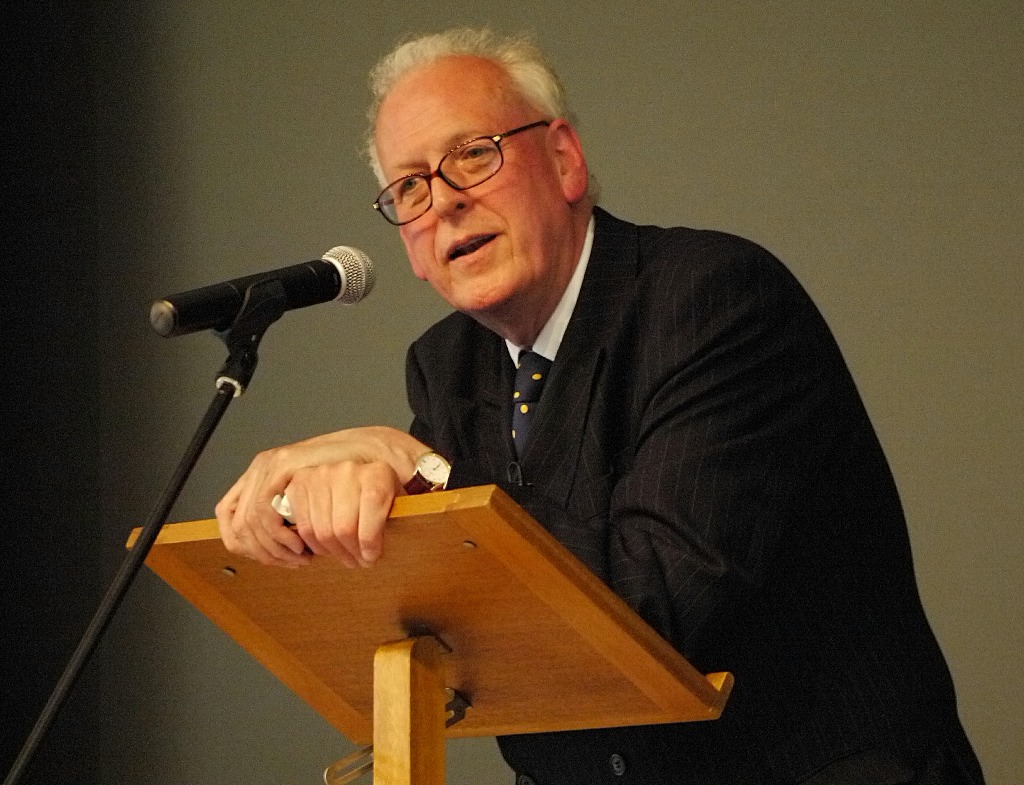I’m continually impressed by the creativity and ingenuity of the people who do the cover designs for high-end magazines like the Economist and the New Yorker. This one from the issue of the New Yorker following Bin Laden’s killing is, IMHO, a minor masterpiece.
Skype’s the limit
This morning’s Observer column.
“A billion here, a billion there, and pretty soon you’re talking real money” is an aphorism frequently attributed to the late Everett Dirksen, the celebrated Republican senator from Illinois, who died in 1969.
While intensive research has failed to unearth documentary evidence for the source of the entire quotation, the phrase “a billion here, a billion there” was one of Dirksen’s mantras which he often deployed in castigating congressional profligacy with taxpayers’ money.
One wonders, therefore, what Dirksen would have made of the news that Microsoft was spending $8.5bn (around £5bn) of its shareholders’ money to buy Skype, the internet telephony venture, in an acquisition that has gobsmacked both the technology industry and Wall Street. It is, said the ArsTechnica analyst, “a deal that’s hard to understand” (translation: nuts).
The scepticism that greeted the announcement stemmed from various sources…
The ‘End of History’ Man redux
I’ve got far too many books to read at the moment, and so have been havering about whether to get Francis Fukuyama’s The Origins of Political Order: From Prehuman Times to the French Revolution, partly because it seems very relevant to understanding why countries like Egypt stand a chance of becoming modern states while one’s like Libya and Bahrain don’t. Until this morning I had concluded that life is too short to read long books way outside of my field, but having read David Runciman’s absorbing review, now I’m not so sure.
Fukuyama’s new book is dominated by the influence of another of his mentors, the conservative Harvard political scientist Samuel Huntington. Huntington is best known for his own cosmic soundbite – The Clash of Civilizations. But his main interest was in political order: how to achieve it and how to mess it up. Basically Huntington thought there are two things that could go wrong on the road to a well-ordered society. You could fail to get there because your society never gets beyond a condition of internecine conflict and incipient civil war. Or you could get there and find your society gets stuck in a rut and fails to adapt to new threats and challenges. Fukuyama takes this framework and applies it to the problem of democratic order. Why is it that some societies have gone down the democratic route to stability while others have remained stuck with autocracy? And will democracies be able to adapt to the new threats and challenges that they face?
Runciman provides a lucid and illuminating summary of Fukuyama’s argument, which I suppose might constitute an argument for not buying the book. Against that, he’s whetted my appetite for it. Damn.
Oh — and while I’m on the subject of understanding why some countries work and others do, there’s an interesting review by Pankaj Mishra of Anatol Lieven’s new book on Pakistan.
Approaching his subject as a trained anthropologist would, Lieven describes how Pakistan, though nominally a modern nation state, is still largely governed by the “traditions of overriding loyalty to family, clan and religion”. There is hardly an institution in Pakistan that is immune to “the rules of behavior that these loyalties enjoin”. These persisting ties of patronage and kinship, which are reminiscent of pre-modern Europe, indicate that the work of creating impersonal modern institutions and turning Pakistanis into citizens of a nation state – a long and brutal process in Europe, as Eugen Weber and others have shown – has barely begun.
The other half: Paul Allen’s autobiography
From my Observer review.
They say you can never be too thin, or too rich. After reading Paul Allen’s memoir, I’m not so sure – especially about the rich bit. After founding Microsoft in 1975 with his friend and schoolmate Bill Gates, Allen spent eight frenzied years building it into the corporate colossus that it is today. But then two things happened: he became ill with Hodgkin’s lymphoma; and he decided that life was too short to endure the perpetual conflict that comes with working with Bill Gates. And so he quit in 1983 (having rebuffed Gates’s offer to buy his Microsoft stock at a knockdown price), held on to his shares and has spent the rest of his life with his money (his net worth was $1bn in 1990 and was 13 times that in 1996).
His memoir, like his life, divides neatly into two parts, of which the first is by far the most engaging. Allen and Gates were schoolmates at the exclusive private Lakeside school in Seattle. Because of the school’s eccentric decision to install a terminal that was linked to a General Electric mainframe computer in a distant office, the two boys had a unique opportunity to teach themselves programming, and in relatively short order acquired more experience and expertise than most undergraduates at the time (the mid-1960s)…
Wittgenstein’s grave
In Ascension Churchyard, Cambridge. People leave the strangest objects and messages on the grave of the great philosopher.
For example:

The ashes of my first wife, Carol, are buried in this loveliest of churchyards, and whenever I go there I always check Ludwig’s grave on the way out. Sometimes the messages are deeply poignant, and make one wonder what lies behind them. There’s a novel here, somewhere.
Roll up, roll up
From Roy Greenslade.
You have just missed one of the great modern journalistic opportunities. An advert on the journalism.co.uk site (but just removed because its closing date was today) was offering the princely sum of £10 per 1,000 words.
It was placed by Snack Media, which boasts: “We specialise in the creation of high quality new media content”.
In its advert, the company said it had received “some big orders” and required writers to complete the wide-ranging briefs.
This involved “writing answers to user questions for a Q&A website – quite easy and fun” and “travel writing” (without, of course, actually travelling).
It added: “We pay £10 per 1000 words. This is non-negotiable.”
Wow!
Assange gets into the gagging game
Fascinating piece by James Ball.
Yesterday, media lawyer and legal blogger David Allen Green published the full text of the gagging order signed by almost all WikiLeaks employees earlier this year.
It's an extraordinary document. WikiLeaks staffers face a £12m penalty if they reveal any information about WikiLeaks' day-to-day operations, let alone any documents given to the whistleblowing organisation.
In a move reminiscent of the UK's reviled superinjunctions, even revealing the existence of the gagging order is itself a breach.
Within minutes of the publication of the gagging document, WikiLeaks supporter Asher Wolf pointed out to her followers that I, during my time with the organisation, had refused to sign the document. Others quickly pointed out the leaked document was unsigned.
Yes, it was my copy of the agreement that was published.
The leak was hardly premeditated though – it emerged through the refusal of transparency campaigner Heather Brooke to believe I was not joking when discussing the terms of the WikiLeaks contract.
Inadvertently, I sent her a photograph of a portion of the document publicly rather than privately, over Twitter. Needless to say, this provoked a lot of interest, and one thing then led to another.
USB: the new WMD?
Who’d have thought that the humble USB-drive could be so useful? First, it turns out that it’s the distribution medium for the Stuxnet worm. And now we find that it was a key element in Osama Bin Laden’s comms system. Here’s The Register’s version:
Osama bin Laden didn’t have a phone or internet connection, but for years he was a prolific user of email who frustrated Western efforts to track him by saving messages to a thumb drive and having them sent from a distant internet cafe, the Associated Press reports.
The process was so tedious that even veteran intelligence officials have marveled at the al-Qaida chief’s ability to maintain it for so long, the news service said. Bin Laden would type the messages on a computer that had no connection to the outside world and then instruct a trusted courier to drive to a cafe so they could be emailed. The courier would then save messages addressed to bin Laden to the same drive and bring it back so his boss could read them offline.
US Navy Seals seized roughly 100 flash memory drives when they killed bin Laden at his Abbottabad, Pakistan, compound a week and a half ago. Officials told the AP they “appear to archive the back-and-forth communication between bin Laden and his associates around the world.” The cache of messages is so big that the government has enlisted Arabic speakers from around the intelligence community to pore over them.
En passant:
The New York Times account of OBL’s daily life in his walled compound suggests that the lifestyle of a terrorist mastermind leaves something to be desired. He didn’t even have a guy to tidy up his power cables.
800-lb gorilla buys cool new gadget
David Pogue’s take on Microsoft’s purchase of Skype.
Every time some big clumsy corporate behemoth buys a popular consumer-tech product, I cringe. It almost never works out. The purchased company’s executives take a huge payday; promises are made all around that they’ll be allowed to continue operating independently; and then, within a couple of years, the product disappears altogether. A little star of the tech sky is snuffed out, for absolutely no good reason.
Yahoo bought GeoCities, Broadcast.com, HotJobs.com, MusicMatch, Konfabulator and Upcoming. AOL bought CompuServe, Netscape and Xdrive—all gone or irrelevant now. Cisco bought the Flip camcorder, and then killed it last month.
But what about Microsoft? Its acquisitions list includes the Sidekick (Danger) service, Groove, Placeware, Massive, LinkExchange and WebTV.
It has shut down all of them.
(As my Twitter follower @jfhaft notes, “Microsoft = King Midas in reverse.”)
I guess what I’m saying is that I’m skeptical. This feels more like an 800-pound-gorilla move than anything that will wind up benefiting you.
Form and function-creep
Just back from the annual Lee Seng Tee Lecture at my college, which was given this year by Peter Hennessy, Britain’s most interesting constitutional historian. His title was “Watching Prime Ministers”, which he interpreted as an analysis of how the functions of the Prime Minister have evolved since the war. It was largely distilled from his book on the subject — The Prime Minister: The Office And Its Holders Since 1945: The Job and Its Holders Since 1945 and was a classic Hennessy performance. That is to say it was conversational, informal, gossipy, thought-provoking, irreverent and informative. It was also leavened with the odd bit of ham acting: one was left thinking that somewhere on his CV there must be a spot of amateur dramatics. He’s an excellent mimic: his impersonation of David Bellamy, for example, was pitch perfect. The only thing that grated slightly was the way he contrives to leave his audience in no doubt that he’s really an insider — someone on first name terms with all the leading politicians, a regular attendee at No 10, privy to lots of off-the-record conversations that the less privileged members of the audience can only dream of. One has the feeling that if one expressed one’s loathing of namedropping to him would reply: “My dear boy, I couldn’t agree more — and I was saying just that to the Chancellor only yesterday”.
But one forgives him because he is such a terrific chronicler and explainer of our recent past. Like me, he’s a great admirer of Clem Attlee, and Never Again: Britain 1945-1951, his book on the Atlee government is, IMHO, masterly.
His lecture took us on a tour of the functions of the office of Prime Minister as they have expanded since the war. The most striking thing to emerge from his analysis is the inverse relationship between (i) the functions of the office and (ii) Britain’s importance in the world.
For example, the Cabinet Office list of Prime Ministerial functions prepared for Clement Attlee in 1947 ran to only 12:
1. Managing the relationship between the Monarch and the government as a whole.
2. Hiring and firing ministers.
3. Chairing the Cabinet and it’s most important committees.
4. Arranging ‘other Cabinet business’, i.e. chairmanships, agendas, memberships of other committees.
5. Overall control of the Civil Service.
6. Allocation of functions between departments; their creation and abolition.
7. Relationships between other heads of government.
8. An especially close involvement in foreign policy and defence matters.
9. Top Civil Service appointments.
10. Top appointments to many institutions of ‘a national character’.
11. ‘Certain scholastical and ecclesiastical appointments’.
12. The handling of ‘precedent and procedure’.
By the time David Cameron arrived in office in 2010, this list had expanded to 47. Yet over the intervening 63 years Britain’s place in the world had shrunk dramatically. The country had, as Dean Acheson memorably observed, lost an empire and failed to find a role — other than as the United States’s poodle. Yet its First Minister was busier than ever. Clearly, Prime Ministerial work is like a gas: it expands to fill the space available.
LATER: There is, of course, one responsibility that Attlee didn’t initially have to shoulder that all his successors have had to take on — personal responsibility for the use of UK nuclear weapons. This went through two phases: first, when the UK’s strike capability was airborne only; and second, after JFK gave Harold Macmillan access to US submarine-launched technology and Britain acquired its own so-called ‘independent’ nuclear deterrent. Hennessy was very interesting on this function of the Prime Minister, which he calls “end of the world stuff”. The big issue is the instructions that Trident captains are given before embarking on the 90-day patrol during which time they are are largely incommunicado. Each incoming PM is now required to write, on four handwritten sheets of paper, the four options that the commander of the submarine is given. These sheets are then sealed and the envelope lodged in the submarine’s safe. Hennessy raised a grim laugh when he claimed that Tony Blair “went white” when this was explained to him, and speculated that one of his concerns was that the trident patrols are not synchronised with the electoral cycle: when Blair arrived in Downing Street, one of the subs was on patrol — with John Major’s handwritten instructions in the vessel’s safe!





